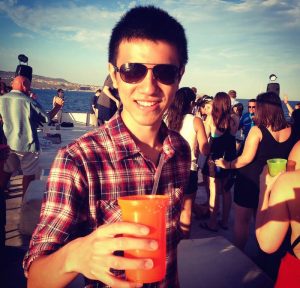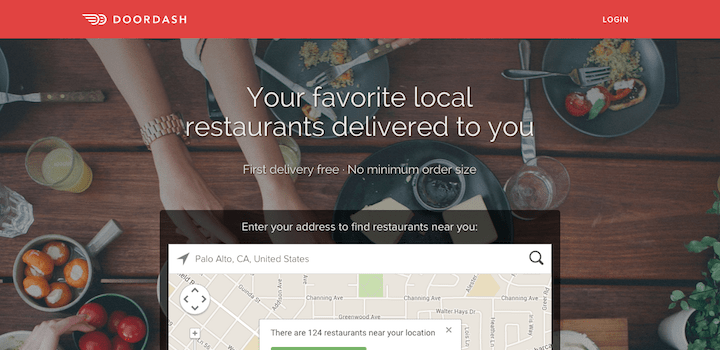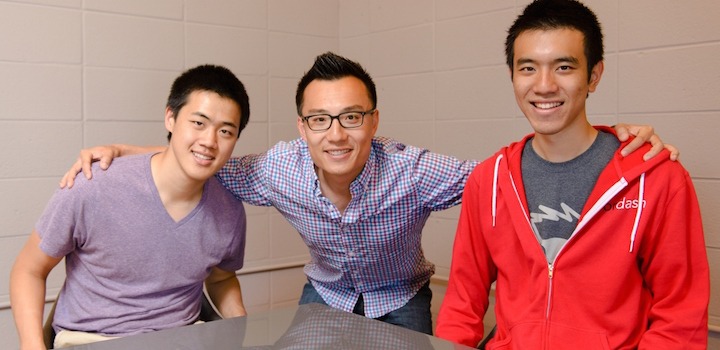
Stanley Tang Interview – From Best Selling Author At 16 To A $57 Million Investment At 22

We first interviewed him when he became a best selling author at 16. His latest project, DoorDash is a tech startup doing restaurant food delivery.
A Stanford graduate, he and three other students founded DoorDash because they wanted food delivery in areas where it wasn’t previously available. Their mission is to empower small business owners to offer delivery in an affordable and convenient way.
Currently restaurants from more than 30 cities in the San Francisco Bay Area are taking advantage of DoorDash. Not only are they creating a better customer service experience for patrons, but DoorDash adds additional income for restaurants and puts money in the pocket of it’s drivers, who currently make up to 20/hr.
Here’s why you should listen to Stanley:
- At age 14 he became an Amazon best selling author with his book eMillions.
- He’s pulled over $57 million in seed funding for DoorDash at the age of 22.
- Leverages the internet to help offline small business owners increase
sales by offering a better customer experience.
Stanley Tang Interview – Founder of DoorDash
We interviewed you when you were 16 years old, having just released your first published book called eMillions. This was ambitious for a 16 year old. Now you are 22 and run DoorDash and have raised over $57,000,000 in funding. What gives you the courage, determination, ambition, faith, belief in yourself to be able to go from 1 ambitious project, to another?
I’ve been working on side projects my entire life – it’s just what I love doing as a hobby. Since eMillions, there’s been many side projects I worked on throughout college that didn’t pan out, including an online news reader, calendar app, group messaging app etc.
Every endeavor I’ve undertaken, I’ve made a ton of mistakes and learned something new. The hope is that you don’t repeat the same mistakes and take those learnings onto your next project.
Digital vs Physical. Explain the transition, is physical as easy as possible?
We’ve actually taken a lot of the learnings from software and brought it into the physical world.
At DoorDash, we’re building the on-demand delivery infrastructure for local cities. DoorDash is very much a software, technology company. We don’t actually own any physical infrastructure, such as cars, warehouses, gps etc. Instead, we build software and use mobile to create a platform that connects drivers who have excess time with merchants that want to offer deliveries.
Was it worth going to University? Looking back, would you still go?
Absolutely! That’s how I met my future co-founders of DoorDash, Andy and Tony. Especially Stanford, where I got exposed to so many different areas of the tech industry.
How do your friends react to your success? I remember when you were 16 telling us how you class mates were impressed that you were publishing a book. 6 years on, how do people react?
It’s not something that I bring up too much these days – that’s in the past. The only thing that matters is what I’m working on right now. In this case, it’s DoorDash.
Why would anyone give you $17 million in funding?
We’ve proven that our model worked in the Bay Area and we were looking to bring on additional funding to fuel our next stage of growth. Since our Series A, we’ve expanded from one to six cities now.
How many people did you have to ask for funding before Sequoia Capital invested in DoorDash?
We went through Y-Combinator in the summer of 2013 and raised a small seed round right afterwards. It wasn’t until April 2014 when we raised our Series A led by Sequoia.
What advice would you give other entrepreneurs trying to decide between getting funding and going it alone?
It’s more of a personal choice. You end up building two very different types of businesses. Going it alone gives you more of a “lifestyle” business. You have more freedom but it would also be difficult and slower to scale. On the other hand, if you raise funding (especially venture capital), all of a sudden, you have investors, board, employees and you’re forced to go big – that’s the only way investors are going to get a return. You raise funding if you want to accelerate growth.
How did you prove the concept of DoorDash could work?
The idea actually originated from an experiment to see if there was consumer demand for delivery. We created a simple landing page that consisted of a few PDF menus, a phone number, and a title across the top that said: “Call this number if you want to order deliveries from these restaurants.”
Obviously, when you called that number, nothing happened – it was just our personal cellphone number. At the time, all we wanted to see was if people would call this number. If we got enough phone calls, then maybe this was a project worth pursuing. That very night, we got a phone call from somebody who wanted delivery. We decided to fulfill that delivery ourselves. The next day, we got a few more phone calls. The day after that, we got even more phone calls. And it just snowballed from there.
It was only after we’ve proven that there’s demand did we actually build out the different functions properly. But in the beginning, it was all about doing things that don’t scale.
In a world where every great idea is copied, how do you stay ahead of your competition?
There’s so much stuff we need to fix internally – the last thing we’re worried about is competition.
What has been your biggest set back and what did you learn from it?
As a startup, we’re always resource constrained. There would be 100 important things to work on, but we only had the resources to pick one or two. I wouldn’t say there were any major setbacks, but more a series of tradeoffs we had to constantly make. And we had to live with the consequences. For example, working on driver products meant the consumer experience suffered.
6 Years ago you told us that the best advice you have ever received was to take action. This is the biggest thing that holds people back. All we hear is people with ideas and dreams, but very few take the action required to make their dreams a reality. How come you are different? Why do you think you take action and others don’t?
I don’t think I’m that different. It’s just my passion for taking on side projects – most of them fail, but some will takeoff, like DoorDash. It’s something I would have done, even if I didn’t get paid.
Recommended Reading:
=> 17 Top Tips For Avoiding Stress and Anxiety As An Entrepreneur
=> Entrepreneur Interview Series: The Man Who Made Volunteering Abroad Easy











